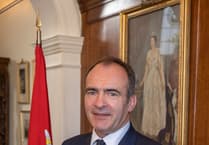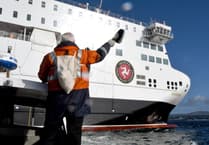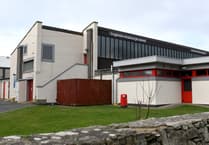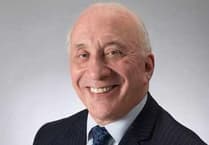The government’s report to create an arm’s length organisation to run the airport has been voted through by Tynwald.
It approved the second step of the transition process, the purpose of which is to identify an operating model that finds the right balance between ‘competing objectives’ and political accountability for the airport.
The report assesses the airport’s current position and makes the case for the change, as well as examines various options available before making its recommendations.
Thirteen MHKs voted for the plan, with six against, while seven were for and two were against the report in the Legislative Council.
Minister Chris Thomas said: ‘We don’t actually have a very good airport at the moment. Our airport is unfortunately pretty near the bottom in terms of regulatory performance.’
He said the department was stepping back from the previous approved Tynwald method and adopting an ‘incremental approach’.
He provided a few costings after a number of members complained about the lack of figures, saying the terminal building reconfiguration is estimated to cost £3 million and new flight management systems would be up to £300m.
He added that the department is ‘well up for an airport masterplan’.
A masterplan is used to articulate a vision, and Mr Thomas said: ‘Ours need to go beyond that. We need to tackle your (MHKs) expectations, public’s expectations and fiscal reality.’
The minister said the masterplan was coming soon.
Despite the plan being passed, a number of concerns were voiced by MHKs in the debate.
Juan Watterson was the first to the punch, saying: ‘I’m at a bit of a loss on this motion.
‘The public outside this chamber might be a bit confused into thinking that Tynwald is being asked to approve this change to governance of the airport, a move that puts more blue water between the politicians and the difficult decisions on revenue raising that are currently taking place.
‘That is not what we are being asked at all. The motion before us says that we receive the report and that we note it.
‘A vote for or against this motion means absolutely nothing.’
He asked if this was the department’s intention and stressed it could undermine Tynwald’s role in policy making.
He also noted there are ‘no tangible time scales’ or budgets and there is ‘no quantification of expected revenue or saving’.
Bill Henderson MLC said the waiting lounge should be ‘completely stripped out’.
‘Words defy me at times with the quality that is offered [at the cafe] when you can get it,’ Mr Henderson said.
His last point related to the landing systems. He continued: ‘I know we’ve just had upgrades but we still can’t land aircraft when it’s a bit misty. It’s causing havoc.’
Douglas North MHK David Ashford explained that he can ‘fully get on board’ with the report, but wanted more elaboration on how it was going to improve the experience for passengers.
He said: ‘‘There are lots of references as to how it will make the airport easier to manage but I’m not sure how it’s going to develop the passenger experience. There are 19 references in the document to the word customer, 10 of which are linked to customer service, but it doesn’t say how it will achieve that.’
He added: ‘Passengers don’t care if it’s run by Disney Limited and Donald Duck is in charge, as long as it improves the passenger experience. We’re running a very old fashioned structure. I want to see this developed.’
Rushen MHK Michelle Haywood didn’t understand the comparisons between other airports in the UK, stating that many ‘aren’t relevant’ as many regionals have suffered due to the pandemic.
She added: ‘This seems like a plan without any supporting data and there’s no time frames or costings but it’s OK because we’re just noting. Duly noted.’
One of Arbory, Castletown and Malew MHK Jason Moorhouse’s concerns was the mention of the York Aviation LLC report, released in 2018.
He said this is already four years old, and ‘is riddled with ifs, buts and maybes’.
Mr Moorhouse worried the customer will see nothing else but ‘more expensive parking’.
‘Another great big plan, another great big cost,’ the MHK said.
Claire Christian, a Douglas South MHK, said that if there is ‘a singular possibility we are voting this through, I will not be’.
She said: ‘There’s no costings. It’s a cost-saving exercise.’
Mrs Christian asked where the business plan was as there was nothing she could physically see of the costs and why the government should invest.
‘It’s just a report about the past,’ she added.
MLC Diane Kelsey suggested the DoI come back with a ‘credible financial plan’ and proposed changes to financial regulations.
Meanwhile, Stu Peters (Middle) said he’d been an aviation enthusiast for most of his life and yet he ‘would rather get the boat’.
He said that getting a flight is often a ‘miserable experience’.
Mr Peters stressed that the airport is the ‘first and last impression’ of the Isle of Man for most who visit, so money should be spent on it.
‘It’s the passengers that need to be at the heart of everything we do,’ he said. ‘We mustn’t squeeze the user until the pips fall out.’
On this, Paul Craine MLC felt the airport should be driving the economy, saying: ‘We want it to be driving the economy as well as facilitating it. I would simply urge for government to step up the ambition without worrying about the constraints of the figures.’
He added the figures don’t represent the value of the airport to the island.
Tim Crookall (Glenfaba and Peel) noted that users of the airport have ‘suffered for years now’ on all sides.
‘It’s been one hell after another for years, it needs sorting,’ he said.
And Rob Callister felt this report was more targeted towards revenue opportunities and not on service delivery.
The Onchan MHK added: ‘All I think the public of the Isle of Man want to see is we get the basics right and deliver the core services we promise.’




